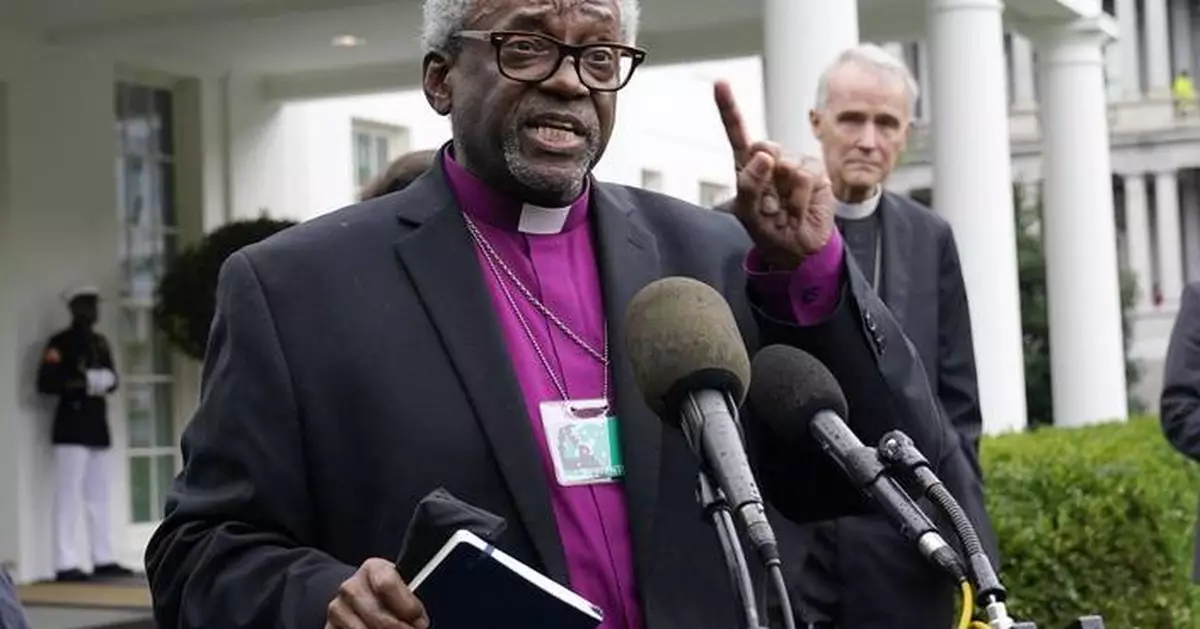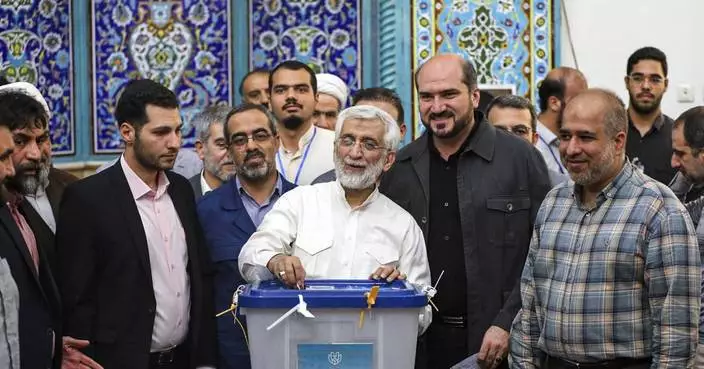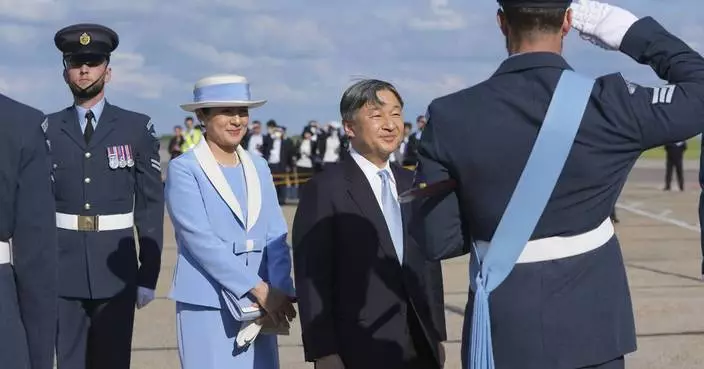Sean Rowe, a 49-year-old bishop from western Pennsylvania, on Wednesday became the youngest person ever elected as leader of the Episcopal Church.
He immediately issued a sobering call for the church, which has faced division and chronic membership loss, to confront an “existential crisis” that he compared with the steel industry collapse in his native Rust Belt.
Rowe, who leads two small dioceses along Lake Erie, will succeed Bishop Michael Curry, the first African American to hold the position, when Curry’s nine-year term ends on Nov. 1. The presiding bishop serves as the denomination’s chief pastor, president and CEO.
Rowe was elected on the first ballot in the House of Bishops, which convened behind closed doors Wednesday in the Episcopal cathedral in Louisville. Rowe received 89 votes, the required majority, with other votes widely dispersed among the other four candidates.
The House of Deputies, consisting of clergy and lay people, confirmed his election with 95% of the vote, followed by strong applause.
The only presiding bishop to take the post at a younger age than Rowe was the first one, William White, who was 41 when he served briefly in 1789 when there was no leadership election.
Rowe was 32 in May 2007, when he was elected bishop of the Diocese of Northwestern Pennsylvania, based in Erie. For almost 12 years, he was the youngest bishop in the Episcopal Church.
In 2019, he also began overseeing the Diocese of Western New York, based in Buffalo. The adjacent dioceses, with less than 10,000 members between them, have been collaborating on ministries in recent years.
He said that sort of collaboration is just one example of how the church needs to adapt to new realities.
“It’s not too strong to say that we’re facing an existential crisis,” Rowe told the House of Deputies after his election. “It’s not because our church is dying, or because we’ve lost the belief in the salvation of God in Jesus Christ, but because the world around us has changed and continues to change. It changes all the time. And God is calling us ever more deeply into the unknown.”
The Episcopal Church is an offshoot of the Church of England in the United States and has been the spiritual home of many of the American founding fathers and U.S. presidents.
But as with other mainline Protestant denominations, membership in the Episcopal Church has been declining for decades. After peaking at 3.4 million in 1959, it had fallen to 1.9 million when Curry was elected leader in 2015 and dipped to under 1.6 million in 2022. Average Sunday church attendance for Episcopalians nationwide was 614,241 in 2015; by 2022 it had dropped to 372,952.
Rowe compared the church's challenges to the collapse of the steel industry, which had employed his grandparents, when he was growing up in Pennsylvania.
“I’ve been around to see things that I love go away,” he said. “I watched everything that I had known evaporate.”
He cited tensions within the denomination, without giving specifics, and called on members to be more gracious and forgiving toward each other. He called on them to turn their “anger at injustice instead of turning it inward on each other."
Still, he offered reassurance by quoting the late Catholic monk and author Thomas Merton — a favorite son of the convention’s host state of Kentucky — about proceeding in faith despite uncertainty.
“You do not need to know precisely what is happening" to embrace challenges "with courage, faith, and hope,” he said.
On a practical level, Rowe called for the church to avoid top-heavy structures and steer more of its funds and resources toward local and diocesan ministries.
Born in Sharon, Pennsylvania, Rowe graduated from nearby Grove City College in 1997 with a bachelor’s degree in history.
He graduated from Virginia Theological Seminary in 2000, before returning to western Pennsylvania.
The bishop is known for his research and work on organizational learning and adaptive performance in the church. He earned a doctorate in organizational learning and leadership at Gannon University in Erie in 2014.
After the election, Curry praised his successor in a news conference. He credited Rowe with both “a vision and a sense of the mechanics that will help us get there.”
Curry, in opening remarks to the General Convention on Sunday, urged delegates to remain optimistic.
“This Episcopal Church is stronger, more durable and has a future that God has decreed and that God has figured out,” he said. “Don’t you worry about this church. Don’t you weep and don’t you moan. Just roll up your sleeves and let’s get to work. That’s our future.”
Throughout his ministry, Curry has been an outspoken leader on a range of challenging issues, including racial reconciliation, climate change, immigration policy, and LGBTQ+ equality. Among his favored causes: establishing ecumenical summer day camps for children, creating networks of day care providers, and encouraging large investments in urban neighborhoods.
In 2018, he became a global star with a stirring sermon at the widely televised royal wedding of Britain’s Prince Harry and Meghan Markle.
Curry, 71, has battled a variety of health problems since May 2023, when he was hospitalized for treatment of internal bleeding and an irregular heartbeat. In March, doctors successfully surgically inserted a pacemaker as part of ongoing treatment.
Associated Press religion coverage receives support through the AP’s collaboration with The Conversation US, with funding from Lilly Endowment Inc. The AP is solely responsible for this content.
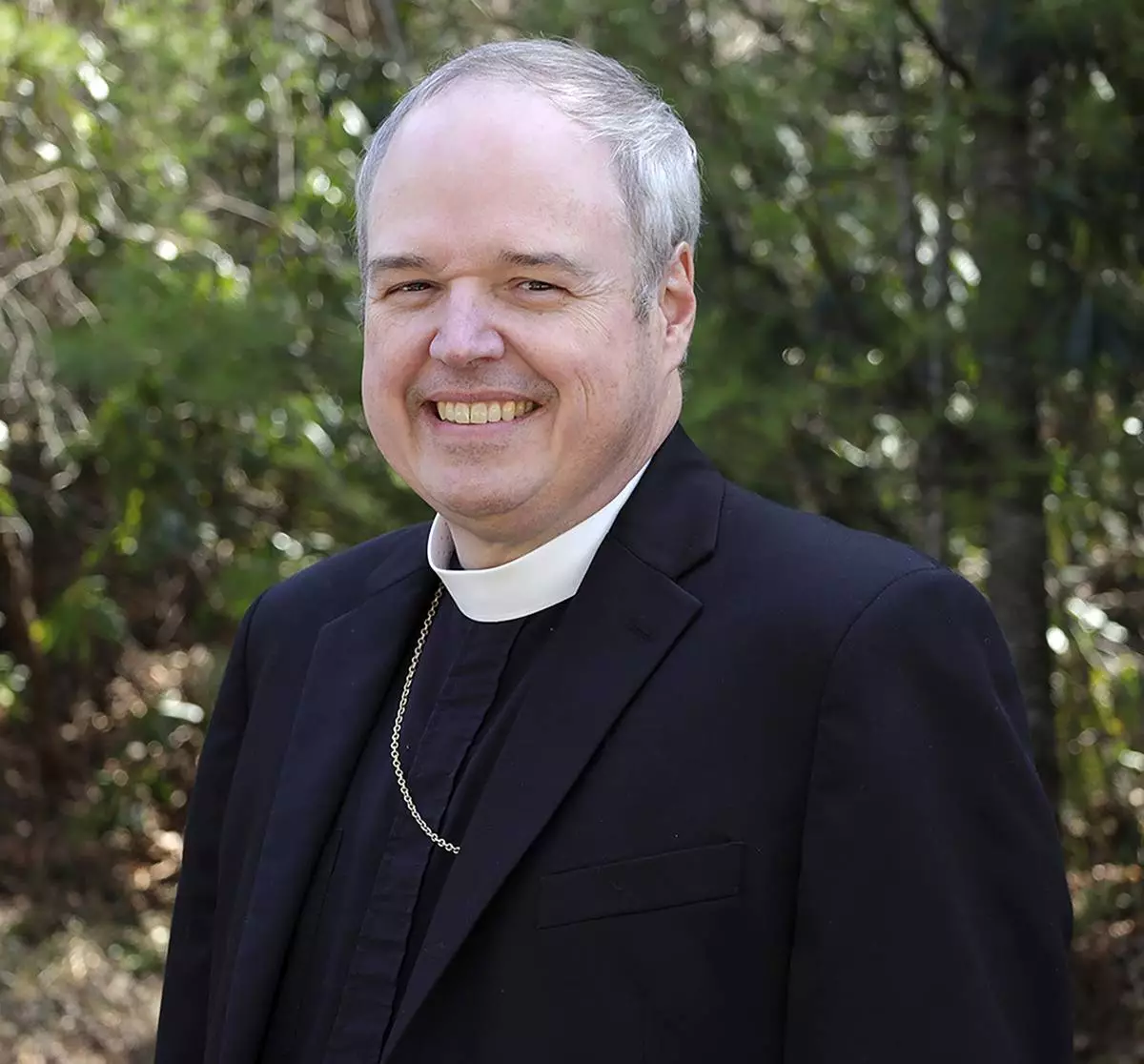
This image provided by The Episcopal Church shows Episcopal Diocese of Northwestern Pennsylvania Bishop Sean Rowe in his official 2024 church photo. (The Episcopal Church via AP)
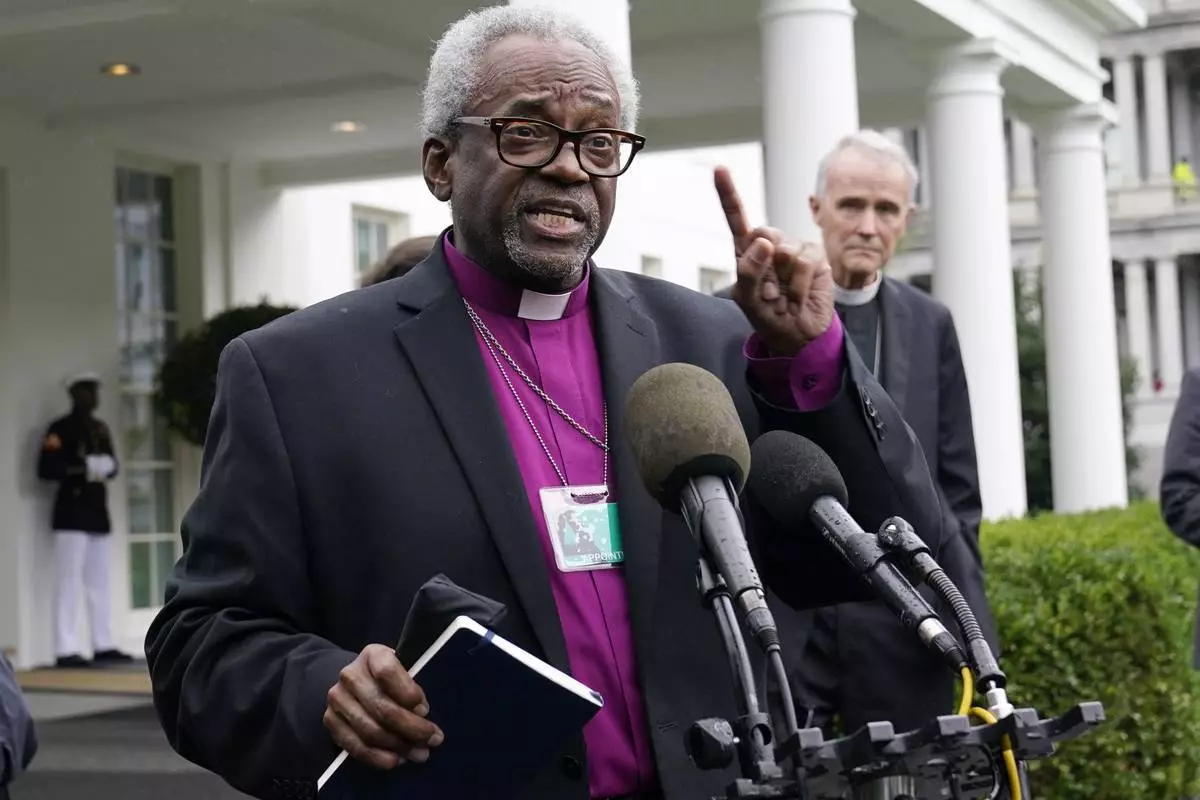
FILE - Bishop Michael Curry speaks outside the West Wing of the White House in Washington, Sept. 22, 2021. The Episcopal Church, at its General Convention in Louisville, Kentucky, is scheduled to elect a new leader Wednesday, June 26, 2024 to replace Curry, who for the past nine years has served as the first African American presiding bishop of the 239-year-old denomination. (AP Photo/Susan Walsh, File)
LONDON (AP) — Britain’s upcoming general election is widely expected to lead to a change of government for the first time in 14 years. Many analysts believe it will be one of the country’s most consequential elections since the end of World War II.
Ahead of the July 4 vote, The Associated Press takes a look back at other landmark U.K. elections since the war.
In 1964, the Conservative Party had been in power for 13 years and was on its fourth prime minister, Alec Douglas-Home.
That has echoes of the current Conservative government, which has been in power for 14 years and is now on its fifth prime minister of the period, Rishi Sunak.
Douglas-Home had only become prime minister the year before, when his predecessor Harold Macmillan stepped down following a huge reversal in fortune. The buoyant economy had faltered, and Macmillan had been snubbed by French President Charles de Gaulle in his application for Britain to join the recently formed European Economic Community.
A sex scandal rocked his government and the British establishment, adding to the general feeling that the Conservatives had lost touch. Macmillan, known as “Supermac,” stepped down soon after his minister for war, John Profumo, resigned for lying to Parliament over his affair with model and showgirl Christine Keeler.
So the 1964 election was a race between the aristocratic Douglas-Home and Labour leader Harold Wilson, who was buzzing with ideas such as harnessing the “white heat of technology” to modernize the ailing British economy.
Wilson also had the common touch, particularly important in the new world of television and with Britain showing signs of a cultural renaissance in the “Swinging Sixties.” Wilson was more than able to hold his own with The Beatles, as evidenced in March 1964 when he presented the Fab Four an award.
When the election came about on Oct. 15, 1964, Labour was widely expected to return to power for the first time since 1951. “13 Wasted Years" was its message. But the party didn't do as well as many had expected, and Labour only won a majority of four in the House of Commons.
Wilson, who at 48 became the youngest British prime minister in 70 years, would need a bigger majority to get major legislation through — and he got it 18 months later when he called a snap election.
Wilson lost the election in 1970 to Ted Heath's Conservatives, but would go on to serve a second term as prime minister from 1974 to 1976, becoming the longest-serving Labour premier in the 20th century. By that second period in office, Wilson was clearly exhausted and lacking the dynamism of his early years.
Britain was widely considered to be the “sick man of Europe” and it was fertile ground for radical change. Step forward, Margaret Thatcher.
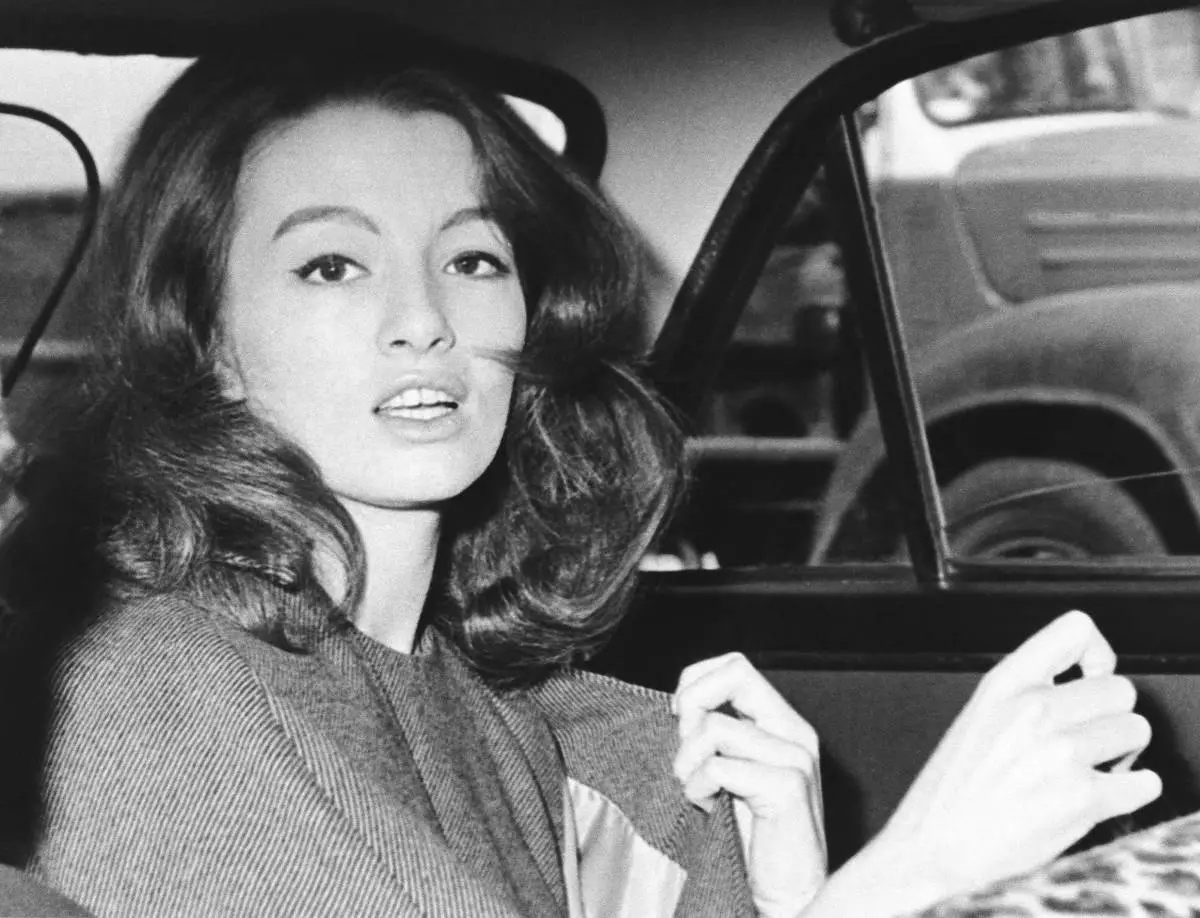
FILE - Christine Keeler, photographed in London in 1963. Britain’s upcoming general election on July 4, 2024, is widely expected to lead to a change of government for the first time in 14 years. In 1964, the Conservative Party had been in power for 13 years and was on its fourth prime minister. A sex scandal rocked the Conservative government and the British establishment, adding to the general feeling that the party had lost touch. Minister for war, John Profumo, resigned for lying to Parliament over his affair with model and show girl Christine Keeler. (AP Photo/File)
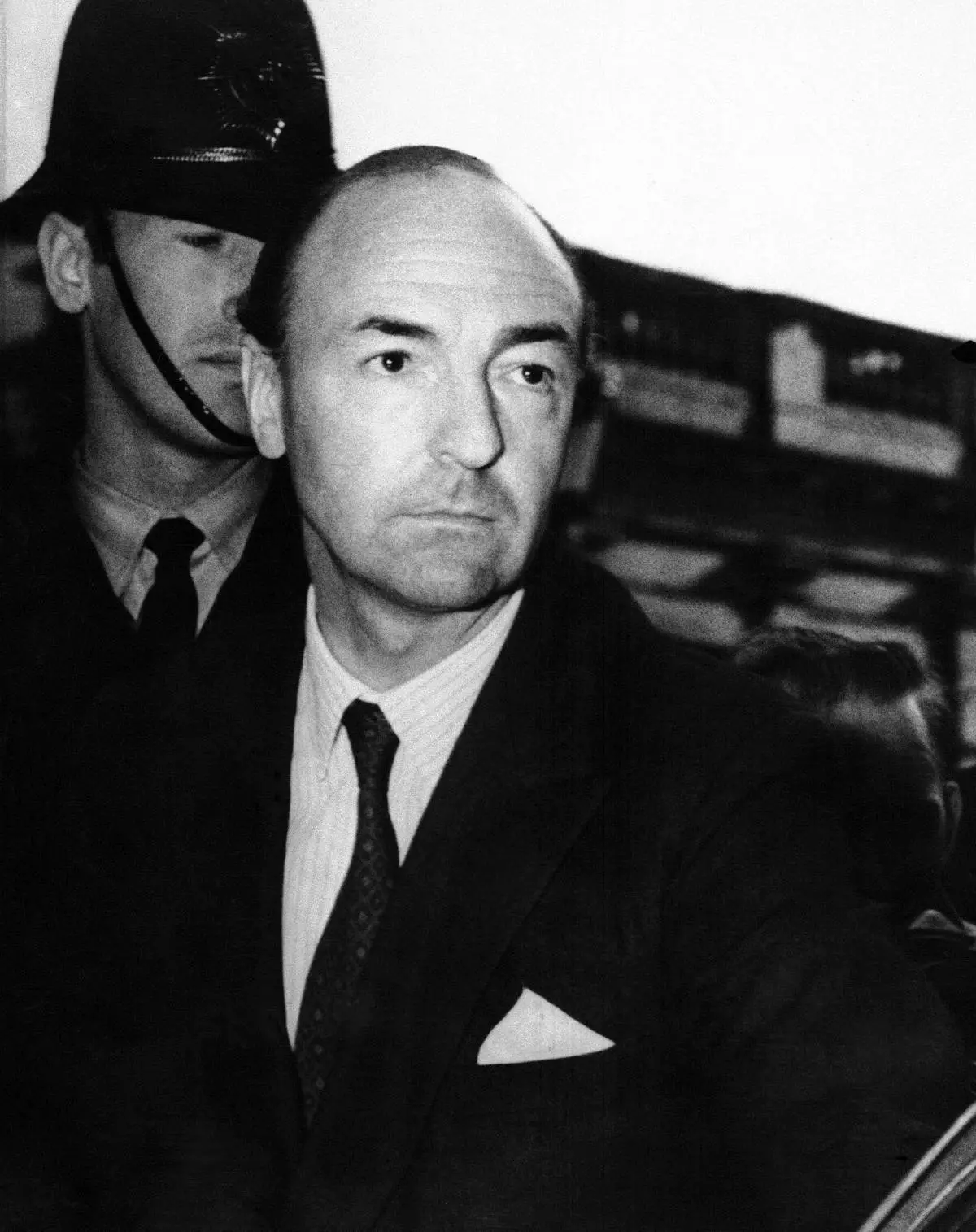
FILE - John Profumo, who resigned as Minister of War in the British Cabinet over his affair with model Christine Keeler, leaves his car on returning to his London home, June 18, 1963. Britain’s upcoming general election on July 4, 2024, is widely expected to lead to a change of government for the first time in 14 years. In 1964, the Conservative Party had been in power for 13 years and was on its fourth prime minister. A sex scandal rocked the Conservative government and the British establishment, adding to the general feeling that the party had lost touch. Minister for war, John Profumo, resigned for lying to Parliament over his affair with model and show girl Christine Keeler. (AP Photo/File)
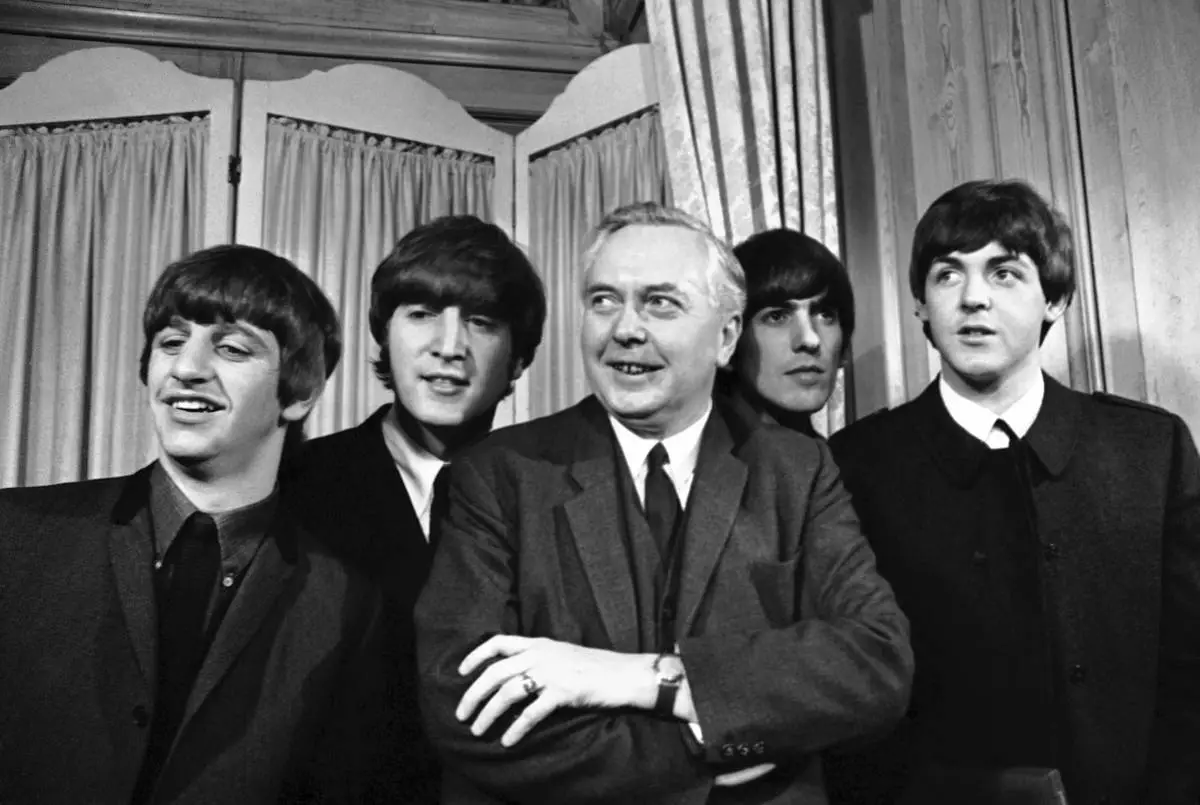
FILE - Britain's Labour Party leader Harold Wilson with the Beatles, from left Ringo Starr, John Lennon, George Harrison, and Paul McCartney, during the Variety Club of Great Britain's Show Business Personality award for 1963 presentation ceremony in London, England, March 19, 1964. Britain’s upcoming general election on July 4, 2024 is widely expected to lead to a change of government for the first time in 14 years. In 1964, the Conservative Party had been in power for 13 years and was on its fourth prime minister. The election was a race between the aristocratic Douglas-Home and Labour leader Harold Wilson, a young politician who was buzzing with ideas such as the need to harness the “white heat of technology” to modernize the ailing British economy. (AP Photo/File)
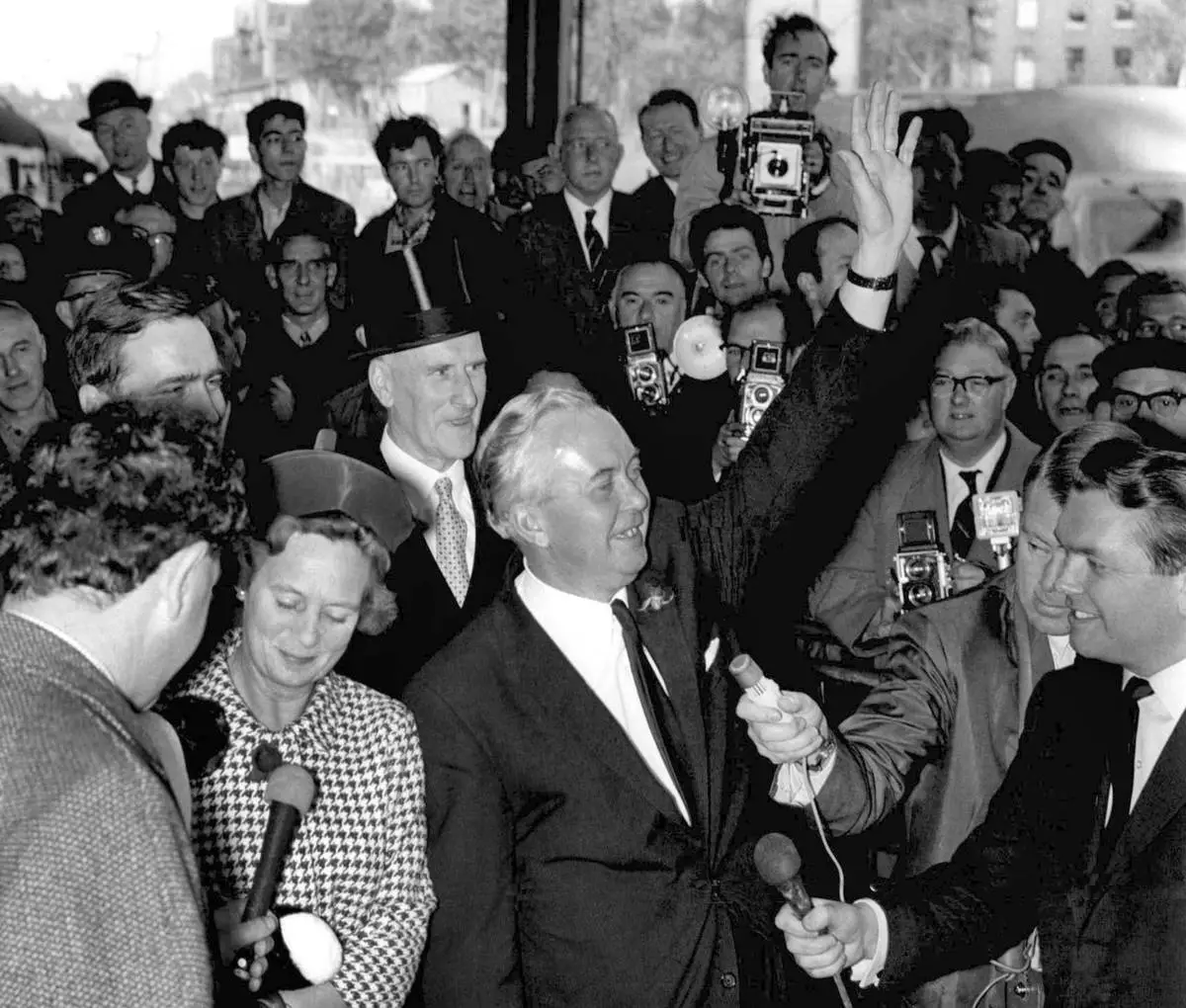
FILE - Britain's Labour Party leader Harold Wilson waves as he and his wife arrive at Euston Station, London, from his constituency in Liverpool, Oct. 16, 1964. Britain’s upcoming general election on July 4, 2024 is widely expected to lead to a change of government for the first time in 14 years. In 1964, the Conservative Party had been in power for 13 years and was on its fourth prime minister. The election was a race between the aristocratic Douglas-Home and Labour leader Harold Wilson, a young politician who was buzzing with ideas such as the need to harness the “white heat of technology” to modernize the ailing British economy. (AP Photo/File)
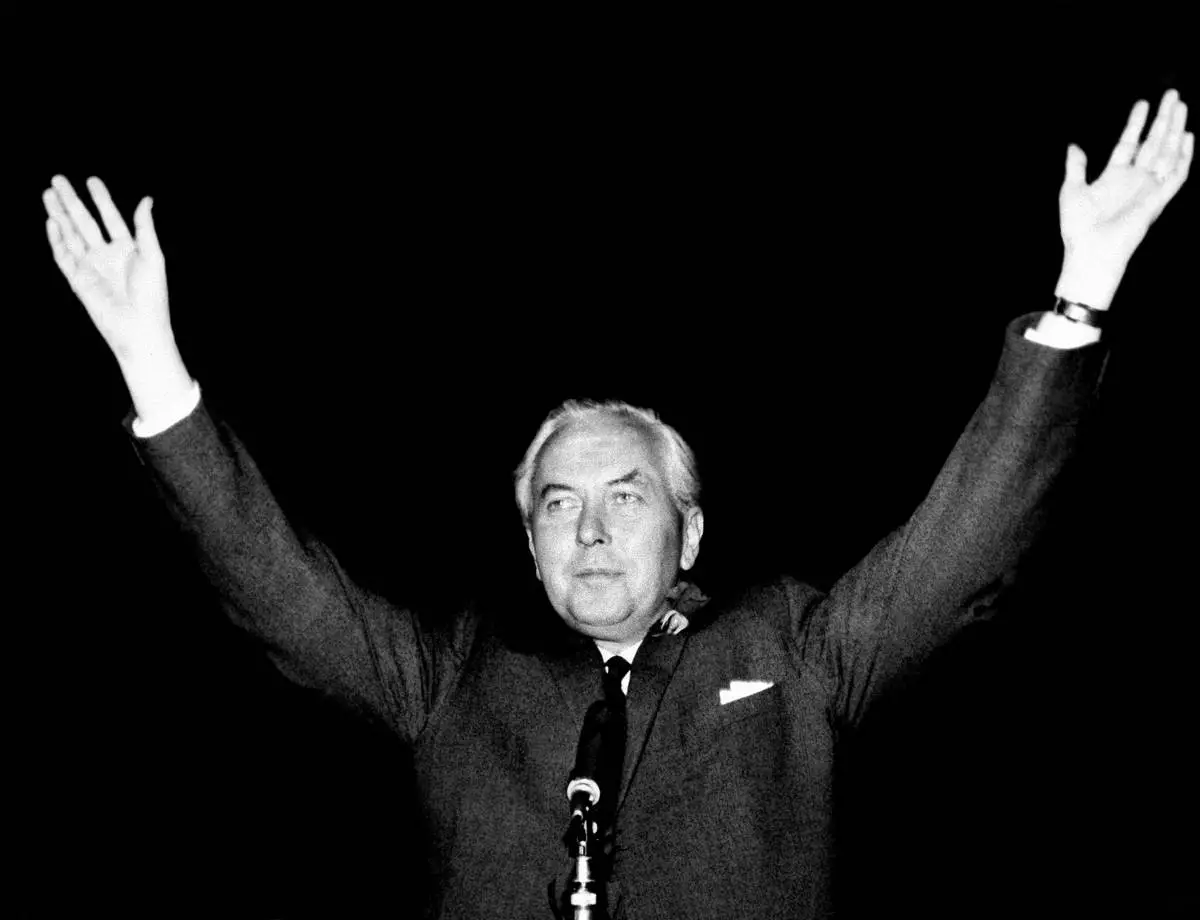
FILE - Britain's Labour Party leader Harold Wilson raises his hands after retaining his seat in the House of Commons and winning the general election, outside the ballot counting rooms rooms at the Huyton Secondary School in Huyton, Lancashire, England, Oct. 15, 1964. Britain’s upcoming general election on July 4, 2024 is widely expected to lead to a change of government for the first time in 14 years. In 1964, the Conservative Party had been in power for 13 years and was on its fourth prime minister. The election was a race between the aristocratic Douglas-Home and Labour leader Harold Wilson, a young politician who was buzzing with ideas such as the need to harness the “white heat of technology” to modernize the ailing British economy. (AP Photo/File)




